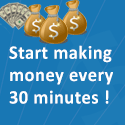loading...
 And of course, there’s more to it than even this extra layer. You need fixed “check points” you run against every product you plan to review, in order to pick the winners. Next time you’re planning to purchase a product – or have been given one by another marketer to try out – ask yourself these key questions:
And of course, there’s more to it than even this extra layer. You need fixed “check points” you run against every product you plan to review, in order to pick the winners. Next time you’re planning to purchase a product – or have been given one by another marketer to try out – ask yourself these key questions:1. “Is the ticket price high enough to make it worth my while?”
2. “Is the commission high enough to make it worth my while?”
3. “Did the product merchant provide affiliate resources and contact info?
4. “Are there any external links on the Sales Page?”
5. “Is it right for my list? Or is there a strong market searching for it?”
6. “What’s the ClickBank gravity rate – and how old is the product?”
Let’s go over these points in more detail.
1. Ticket Price - most marketers agree a product has to clear $17 to be worth your while to promote. (Take note: “Super affiliates” looking to promote products prefer the highest priced items.)
2. Commission Rate – A commission rate over 40% is worth considering; 60% and over makes it extremely worth a second, in-depth look.
3. Able to contact the Merchant? – a merchant who knows what he or she is doing will have contact information in place within their ClickBank info, where you can quickly reach them. When you ask the product merchant what resources he has to help you promote your product, he should be able to offer you banner and button ads, text link ads, graphics, FAQ sheets, information and many more resources.
If a merchant doesn’t have these, it doesn’t necessarily mean you shouldn’t promote the product: But it will make your job harder – and it can also indicate they’re not experienced (a fact that can work for you, under certain circumstances we’ll explore shortly.)
4. No External Links on the Sales Page – Finding a sales page that has a huge flashing sign in the middle – “Affiliates Sign Up HERE!” – should be an instant disqualifier (as should lots of other external links on the sales page).
Customers will most likely reach the sales page, and there’s a big risk they’ll decide to become affiliates themselves, forsaking your affiliate hoplink… which means you won’t get credited for the sale!
4. Is It Targeted to your List or Niche? – If your list (or a particular niche market) is searching for your product, then it’s worth promoting. Check your keyphrases in Google AdWords and make sure there are at least
20 strong keywords that turn up in your search results. (A niche can still be profitable if there are less than 20 keywords – providing there are a high enough number of “related” Google Adwords keywords.)
5. Gravity Rate – “Gravity” is just one of the terms on the ClickBank marketplace listing for your product. It refers to the number of affiliates promoting the product. It’s not a strong indicator of a product’s value unless you compare it against the time the product has been in circulation: Products that are just launched will often have an artificially high gravity rate that levels off, once it’s been on the market a few weeks. You’ll see products with astronomically high gravity rates such as these…
Some traditionally strong areas are:
- Forex trading
- Acne
- Insurance
- Mortgages
- Anti-Aging skin care
- Dating











No comments:
Post a Comment